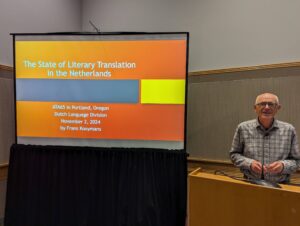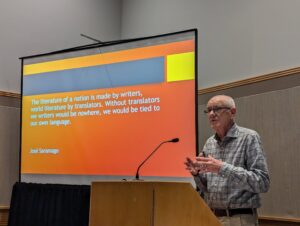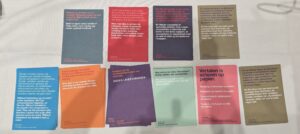By Irene Stoel

Frans Kooymans’s second workshop at ATA65 took place on Saturday afternoon, right before the conference’s closing session. The DLD Distinguished Speaker was going to speak about the state of literary translation in the Netherlands, pulling from his own experience as the translator of the book “All God’s Dangers” as well as his dealings with the Expertisecentrum Literair Vertalen (https://literairvertalen.org/english).
To start with the summary, the state of literary translation in the Netherlands is not rosy, but there are organizations that can help starting and continuing literary translators.
Literature requires readers and their numbers are dwindling, but there are some promising developments. Literature is an important part of life, with themes, such as love and hate, war and peace, religion, tolerance and intolerance, emotions and certain eras. Translators are a significant element of literature, because without them we would not know a lot of the classics.
The literary translator, however, is at risk of going extinct. In a 2019 article in the NRC Handelsblad, writer and journalist Abdelkader Benali drew attention to the scarcity of literary translators with an article titled “Save the literary translator”.
Given the fact that the Dutch market is small and the Dutch language not widely spoken, Dutch writers need translators to expand their audience. The other way around, when you go to a bookstore in the Netherlands, you’ll notice that 70% of the books sold were originally written in a different language. The scarcity of the literary translator is a disaster for our culture.
What are some of the threats for the Dutch literary translator?
- The recently created Dutch government has suggested increasing the Value-Added Tax on cultural activities from the low rate of 9% to the high rate of 21%. This means that books will become more expensive.
- All translators are dealing with the rise of Artificial Intelligence. Even though it is not suitable for literary translations, rates are still down.
- Literary translations require extensive research and as such a lot of time. There are few professional literary translators; many are doing this as a hobby, because the income is lower than that of an average factory worker.
- 75% of the translations are out of English. There is a lack of diversity and a drop in quality.
- There are very few young people who decide to specialize in literary translation.

There are also positive developments!
- There are multiple Dutch organizations that are helping literary translators, such as the above-mentioned Expertisecentrum Literair Vertalen (ELV) and the Nederlands Letterenfonds, the Dutch Foundation for Literature (https://www.letterenfonds.nl/en).
- The universities of Utrecht and Louvain have master programs for literary translators.
- The ELV has developed a knowledge database (https://literairvertalen.org/kennisbank) with articles and reference materials about literary translation.
- The Letterenfonds awards grants for foreign publishers for publication of work that was originally in the Dutch or Frisian language. They also showcase Dutch books for which translators are sought.
A success story is the novel The Discomfort of Evening (De Avond is Ongemak) written by (Marieke) Lucas Rijneveld and translated by Michele Hutchison, which won an International Booker Prize in 2020. It is an example of a Dutch novel that deserved a broader audience.
In conclusion, the ELV in particular has been instrumental for the visibility of current literary translation. It has allowed translators to expand their network, created a knowledge database as well as a translators database that allows clients to find translators.
Frans brought lots of brochures and postcards from the ELV.

If you would like to write an article for the DLD blog or have a suggestion for a topic, feel free to send a message to Irene Stoel, blog coordinator, at irenestoeltranslations@gmail.com.
